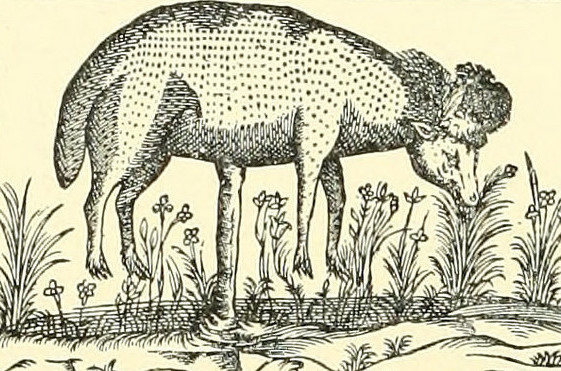Ancient Psychedelia: Alien Gods & Mushroom Goddesses
Online Book - Chapter 11, Page 205
Back to Online Book Mainpage / Next Page (Chapter 11, Page 206)
 (72c) Vegetable Lamb of Tartary Mandeville wrote that “each plant bore a single fully grown lamb, with a thick coat of wool “as white as snow.” Rabbi Simeon, of Sens (died about 1235), writes: “No creature can approach within the tether of the stem, for it seizes and kills them. Within the tether of the stem it devours the herbage all around. When they want to capture it no man dares approach it, but they tear at the stem until it is ruptured, whereupon the animal dies.” Another commentator, Rabbi Obadja of Berbinoro, gives the same explanation, only substituting: “They aim arrows at the stem until it is ruptured.” Hebrew writer Masse Tobia (Venice 1705) describes the Borometz, “According to those who speak of this wondrous thing, its taste is like the flesh of fish, its blood as sweet as honey, and it lives as long as there is herbage within reach of the stem, from which it derives its life.” (189) An important fact to take note of now is how Sir John Mandeville was the same source for the mythological descriptions and imagery of the monopedes, which we will get to shortly. In the story of Iason and the Argonauts, Medea, the king’s daughter falls in love with Iason at first sight. She can have any man in the kingdom, but her love for Iason compels her heart like no other. The king would only grant Iason the Golden Fleece if he accomplishes a certain task and returns. Medea is terrified because she fears for Iason’s life. Next we read sections from Ovid’s Metamorphosis: “[23] Whether for life or death his numbered hours are in the mercy of the living Gods, and that he may not suffer risk of death, too well foreseen, now let my prayers prevail -- righteously uttered of a generous heart without the stress of love. What wicked thing has Jason done? His handsome person, youth, and noble ways, would move a heart of stone. Have I a heart of flint, or was I born a tigress to deny him timely aid? - Unless I interpose, he will be slain by the hot breath of brazen-footed bulls, or will be slaughtered by the warriors, sprung miraculous from earth, or will be given to satisfy the ravenous appetite of a huge dragon. Let my gloating eyes be satiate with his dying agonies! Let me incite the fury of these bulls! Stir to their blood-lust mad-born sons of Earth! Rouse up the never-sleeping dragon's rage! - Avert it Gods!” |
Medea fears he will either be killed by the “brazen-footed bulls,” the “warriors sprung up from the earth” or the “huge dragon.” We already know that the bull is a metaphor for the mushroom, we will soon discover all the ways the dragon is symbolized as well, but who are the “warriors sprung up from the earth?” The next important scene has Medea trying desperately to fight off her passions and love for Iason. She struggles until she sees him once again, and then, “For on that day his graceful person seemed as glorious as a God;—and as she gazed, and fixed her eyes upon his countenance, her frenzy so prevailed, she was convinced that he was not a mortal. And her eyes were fascinated; and she could not turn away from him. But when he spoke to her, and promised marriage, grasping her right hand: she answered, as her eyes suffused with tears; “I see what I will do, and ignorance of truth will not be my undoing now, but love itself. By my assistance you shall be preserved; but when preserved fulfill your promise.” He swore that she could trust in him. Then by the goddess of the triple form, Diana, Trivia, or Luna called, and by her sacred groves and fanes, he vowed, and by the hallowed Sun that sees all things, and by his own adventures, and his life,—on these the youthful Jason took his oath.—With this she was assured and quickly gave to him the magic herbs: he learnt their use and full of joy withdrew into his house.” We just read how she sees that “he was not a mortal,” similar to Gilgamesh. The term “fascinated” is used to describe her eyes upon seeing him. She promises to “preserve him” and he vows to “fulfill a promise” then “magic herbs” are mentioned. The promise being of course, his radiating opulence and “inspiration” some fortunate soul will consume. Continuing: “When Iason saw the “brazen-footed bulls”; “The son of Aeson went to meet them. As he came to meet them the fierce animals turned on him faces terrible, and sharp horns tipped with iron, and they pawed the dusty earth with cloven feet, and filled the place with fiery bellowings. The Minyans were stark with fear; he went up to the bulls not feeling their hot breath at all, so great the power of his charmed drugs; and while he was stroking their down-hanging dewlaps with a fearless hand, he placed the yoke down on their necks and made them draw the heavy plow, and cut through fields that never felt the steel before.” (189) The Vegetable Lamb of Tartary, A Curious Fable of the Cotton Plant. To which is Added a Sketch of the History of Cotton and the Cotton Trade – Henry Lee - For Centuries People Thought Lambs Grew on Trees” by Abbey Perrault - https://www.atlasobscura.com/articles/lamb-plant-myth |
Go Back to Page 204